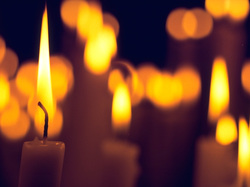 Sometimes, trying to push out the words of a new story or poem is just like trying to push out a newborn. The words get stubborn and comfortable inside the mind where they've been gestating for days, weeks, months, sometimes years. They cling onto the notion that they are safer if they stay wrapped up inside the uterus of the writer's mind. So, sometimes we writers need a literary midwife or two or three to coach us and coax that baby out. Somebody who'll stay with us and that story 'til the birthing process is done. Somebody who'll say, "Daughter, let those words go. Ain't you tired of carrying that full-term baby around in your belly? You are? Then bear down, baby. Bear down and push that baby out." I am in the wonderful, scary space of completing my second novel. The bearing down and pushing out of the words has, at times, been difficult, but thankfully, I have a village of literary midwives who are constantly encouraging me and pushing me to birth this baby out. So, today, I honor them. They know who they are. Love.
0 Comments
 I suffer from depression and anxiety. Whenever I reveal that part of myself to people, most times I get, “Oh, you just worry too much. Just let it go.” Or I hear, “Honey, I do too. I just don’t let it get to me.” The problem for those of us living with clinical depression is there often isn’t something tangible to let go of and trust and believe, if not allowing “it” to get to us was an option, we would all be cured. People with the type of depression and anxiety I suffer from can be fine one moment and feeling like they are about to have a heart attack or stroke the next. The worst anxiety attack I ever remember having was when my son was a toddler and I had just picked him up from daycare. Nothing in particular was bothering me that day. In fact, I remember having had one of the best discussions with my Freshman English class earlier that day, so there was nothing going on to forewarn me of the meltdown I was about to have. I went inside the daycare, spoke to everyone, and gathered up my son’s belongings without incident. But, as I walked to the car, I felt panic swell up in me from the tip of my toes, to the top of my head. I was fortunate to even get him into his car seat. I know we sat outside of his school for at least thirty minutes, perhaps longer. I couldn’t breathe. I was sweating profusely, and I was gulping for air and trying to free my clouded brain enough to figure out what to do next. My son was terrified. At that time, I didn’t have a cell phone. There was a pay phone outside his daycare, but the thought of walking the few steps it would have taken to get to it and make a call to my ex-husband or my good friend, seemed as implausible as me climbing up Mount Everest. And anyway, at that time, there was no one I felt safe calling. Paranoia and the reality of my situation kept me from seeking help. Thankfully, the feeling of anxiety passed. I pulled myself together and drove my son directly to McDonalds. Money was tight back then, but I knew without all doubt that for what he had just endured, I was determined to reward him with a Happy Meal. For months after that, those attacks would come on me without rhyme or reason. Once it happened while I was at a poetry reading. The actress in me came out. I worked my panic into my reading and the crowd loved it. They loved it and I felt like dying. My depression is something altogether different than the panic attacks. There is no “acting” through it. Imagine there is a huge boulder inside your head, weighing down your brain. Imagine trying to think with such a boulder pressing against the parts of your brain that allow you to function. Clinical depression is not sadness. Living with clinical depression, when it is at its worse, is like being inside of a dark hole where there is limited amounts of oxygen for you to even breathe, let alone get up and be a productive person. Some days, when I felt that overwhelming feeling of despair, I could fight it. Most days, I just had to ride the wave until it let up. I am not ashamed to say that I rely on meds to help me deal with it. But even being on medication can be a trial for the person living with depression. I have had “well-meaning” people tell me, as I’m struggling to hang on, if my faith were stronger I wouldn’t need the meds. I’ve said in response, when I had the energy to respond, “Yeah, so go tell that to the person with diabetes, heart disease, and high cholesterol.” Years ago, I had a stroke. For a time, doctors had me taking medicine to prevent me from having another one. I cannot imagine those same people telling me, “Oh, stop taking those blood thinners. Where is your faith, dear?” Well, I am here to tell those of you, who think depression is a game some people play to get attention (Oh yeah, I’ve heard that one too) or that it is not equal to the diseases I listed above, in the loudest voice I can muster, DEPRESSION AND ANXIETY IS REAL. So, if you can sympathize with those individuals with “physical illnesses,” then please, do the same for those of us who struggle to cope with depression and anxiety. I mean, I do get why people are confused. Everybody feels sad sometimes. We all get anxious. Well, I am here to tell you, what ordinary people feel and what those of us with diagnosed depression and anxiety feel is almost literally night and day. There are days when raising my head off the pillow seems too much. There are days when I feel weepy for no apparent reason. There are days when I know I have tons of things on my to-do list, but the best I can do is channel surf and watch reruns of Project Runway or Charmed. There are days when I put on my “Angela Jackson-Brown persona” and pray that others can’t see how vulnerable and broken I feel inside. There are times when I have thought about dying. Wished for the death angel to come and steal my breath away. Thankfully, those days are few and far between. Thankfully, I now have a husband who “gets” me and knows that when I withdraw it isn’t personal. He understands that sometimes the shadows are more real to me than flesh and blood. But again, thankfully, those days are not the norm. So, why am I confessing these details about myself? Mainly so people will understand that those who appear to be the most “put together” are often the ones with the most cracks. Telling this part of my story is a bit frightening. The questions always are: “What will people do with this information?” “Will coming clean about my experiences with depression and anxiety affect my personal life?” “Will it affect my career?” Well, today, I say, Whatever. If sharing my most closely guarded “secret” can help someone, then so be it, and let whatever comes come. I have held crying, depressed students in my arms. Students who were so far over the edge I was amazed they were still hanging on. Students who could not produce a medical document saying they were sick, but all it took was for the fellow sufferer in me to look at them and know, those young men and women are drowning. So, with them, I share my story. And if they repeat it and/or twist it, I say, that is on them. But mainly what I see happen when I tell them my truth is their eyes become less cloudy. Most times they look at me incredulously and say, “You? You have this too?” My answer is “Yes. I do. But, we can fight it. We can win. It doesn't have to define us. We can take this mess and turn it into our message.” You would be amazed at how much good you can achieve by just owning up to your “stuff.” No matter what the stuff might be. Hence why I talk about the child sexual abuse I went through. Hence why I talk about being adopted. Hence why I talk about my struggles with my health. Suffering in isolation is the worst part of suffering. If we can speak our truth to the world, then we have the power to overcome our suffering. We live in a society where it is acceptable to live with diabetes, heart disease, chronic arthritis and a myriad of other conditions. Yet, to acknowledge having any form of depression or mental illness is often a quick way to lose respect and confidence from those in our lives, both professional and/or social. The CDC reports “1 in 10 U.S. adults report” they are living with depression. The operative word is “report.” Because depression and anxiety is such a taboo issue, most people just “live with it.” Silently. This is wrong. No one should have to face this sickness alone. And no one should be condemned for having to deal with this monster of a disease. So, I am coming out of the closet. Yes. I am a survivor of depression and anxiety. Yes, every day I get up and use every coping mechanism I have to keep myself above water. Some days I float. Other days, it is a constant doggy paddle to keep from going under. But in the words of V. Michael McKay and Paul Jones, “All of my good days,/Outweigh my bad days/I won’t complain.” Angela Jackson-Brown was born in Montgomery, Alabama and grew up in Ariton, Alabama. She is an English Professor at Ball State University in Muncie, IN. She graduated from Troy University in Troy, AL (B.S. in Business Administration); Auburn University in Auburn, AL (M.A. in English); and Spalding University in Louisville, KY (MFA in Creative Writing). Her work has appeared in literary journals, such as: Pet Milk, Uptown Mosaic Magazine, New Southerner Literary Magazine, The Louisville Review, Muscadine Lines: A Southern Journal, Blue Lake Review, Identity Theory, Toe Good Poetry, and 94 Creations. Her short story, “Something in the Wash” was awarded the 2009 fiction prize by New Southerner Literary Magazine and was nominated for a Pushcart Prize in Fiction. Her play, Wade in the Water, was professionally read at The University of Louisville in the summer of 2012. Her debut novel, Drinking from a Bitter Cup was published by WiDo Publishing on January 7, 2014. She is the mother of two sons, Justin Bean and Michael Brown, and the wife of Robert L. Brown.  Our sons are imploding on themselves. Across all ethnic and social groups, these young men-children are imploding AND WE ARE STANDING AROUND WATCHING AS IF THIS MESS WAS A QUENTIN TERANTINO MOVIE AND NOT REAL LIFE. If we are waiting for "the government" to "change" things, we are fighting a losing battle. The village needs to rise up again. The young men are sending us all of the signals we need that they are drowning and we are standing around with life vests in our hands WATCHING THE TIDE TAKE THEM OVER. PARENTS/TEACHERS/COUNSELORS/COACHES/MENTORS: If you parent/mentor/teach a man-child who is a loner, spends hours playing video games, watches hours of violent television/movies, suffers from manic depression, is bullied, is fascinated by weapons (guns, knives, etc.), doesn't talk to you or anyone, spends hours developing his on-screen persona, THREATENS TO TAKE HIS LIFE OR OTHERS ---THESE ARE RED FLAGS. I'm not saying every young man who fits the descriptions above is a killer in training, but I am saying THOSE ARE SIGNS. If my son suddenly had trouble breathing, that's a sign something is wrong. I'm not waiting to see if something else goes wrong with him, all I need is ONE SIGN and I am investigating with all of the power my body and mind possesses. We will miss signs. We're human. But when the signs are FLASHING in our eyes, blinding us, how can we continue to ignore them? WE DON'T NEED LEGISLATION TO FIGURE OUT OUR YOUNG MEN ARE DROWNING! THE VILLAGE NEEDS TO RISE UP AND RECLAIM OUR YOUNG MEN AGAIN. I don't wait for the young men I teach to "come to me" if they have a problem anymore. I look for the signs, and I pounce. I don't have that kind of luxury to wait for them to realize they are drowning anymore because these men-children are not waiting on us anymore. They are crying out and acting out in ways that brings closure to the lives of others as well as their own. While I wait, my classroom could easily turn into a blood bath. We see it on television every week, sometimes every day. I can't wait for my leaders to lead us out of this wilderness. I love living too much, and I love seeing life radiating on the faces of my students way too much to wait for my government or my employer or anyone else to FIX THE PROBLEM with band-aids and duct tape. And the overwhelming feeling I experience every day I walk into the classroom is, even with all of the precautions I take for myself and my students, we are still at risk. We are still on the frontlines with nothing but slingshots made out of useless rhetoric spoken by politicians and news people who don't even have a clue. On average, I am responsible for 90+ students every semester. I am responsible for making sure that 180 +/- parents get to hold their child again after the semester is over. The days of throwing signals and hints to them to "share with me" if they are struggling has passed. While I'm waiting for them to get brave enough to approach me, I and my students could all be dead and gone. If I can see with my natural eyes that I have students, particularly male students--no matter the hue of their skins--who are coming apart at the seams, I run not walk to them, and engage them in nonjudgmental conversation. I give them my phone number if I see they are without a support system. I tell them, call me and I will not judge you. I encourage them to get counseling. And when necessary, I alert the powers that be that WE have a troubled man-child or girl-child in our village and WE have to do something to help them. WE HAVE TO SEE THEM AGAIN. We have to stop being afraid of gathering them up in our protective wings. We have to stop being afraid of pissing off a teenager or a young adult by getting "in their business." We have to stop trying to be their "friends." That doesn't mean we can't be friendly, but these men-children need authority figures who care and are offering help and solutions more than they need a "buddy." We have to stop waiting for laws and laws and more laws to FIX what is wrong with our men-children. THEY ARE BROKEN. THEY ARE BROKEN. They are broken and no single law alone is going to fix their brokenness. We see them drowning and we do nothing. Gun laws alone will not fix the problem. Mental health laws alone will not fix the problem. Putting warning labels on video games and movies alone will not fix the problem. Parents and teachers and neighbors have to re-engage with our young men. That means, we correct them. We challenge them. We support them. We love them and we DON'T judge them according to their zip codes. We love them because they are a part of our village and our village includes all parts of this country, not just the the dot on the map where we live. WE HAVE TO RE-ENGAGE THE VILLAGE. THE VILLAGE HAS TO RECLAIM OUR MEN-CHILDREN AGAIN BECAUSE RIGHT NOW -- we are losing them. |
Archives
March 2021
Categories
All
Blog Roll
|
 RSS Feed
RSS Feed







